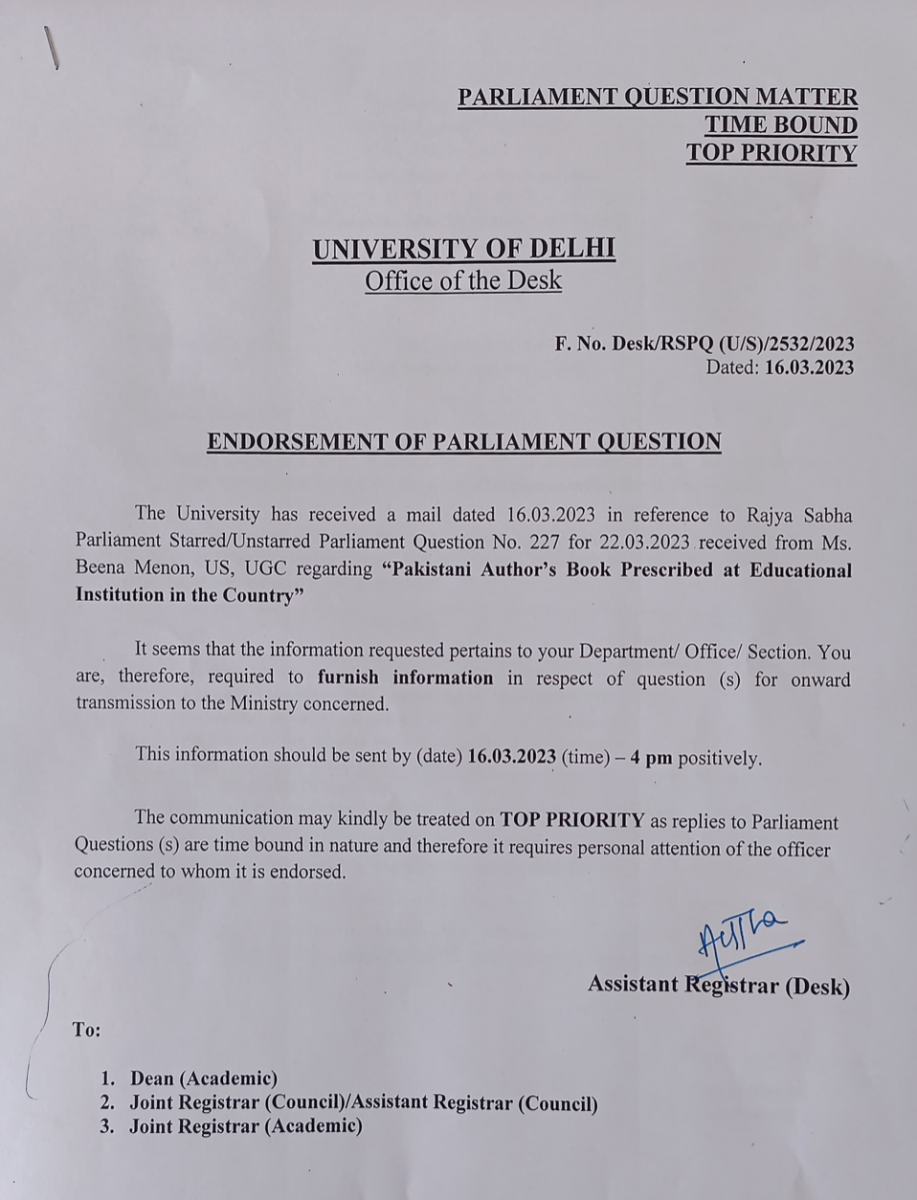
“Whether Government has taken cognizance of the fact that a book by Pakistani author is being taught at Aligarh Muslim University, Jamia Millia Islamia or any other educational institution in the country and the language is derogatory to Indian citizens and also supports terrorism; if so, the details thereof, and whether Government should consider to scrutinize the contents of textbooks written by the said Pakistani author and take action against the persons responsible for the same?”
This question, having been asked by Bharatiya Janata Party Rajya Sabha MP Harnath Singh Yadav, needs to be mandatorily answered by the government.
But how is the government supposed to know what is taught in which university?
It would naturally seek data from the agency which deals with higher education institutions. The question names Aligarh Muslim University and Jamia Millia Islamia specifically but is also concerned about other universities, so the government referred the matter to the University Grants Commission.
The commission sent it to all the universities.

The university authorities then circulated this question among their departments to elicit information. Now it is for the departments or centres to furnish information to their authorities who will then share it with the UGC to enable it to share it with the government.

Before we talk about this question and this investigation drive, it is necessary to ask whether this question has also been sent to the institutions that make school textbooks or not. Would there be no text written by a Pakistani which is included in any school textbook? How is one so sure? Also, is this question being asked only from central universities or do state universities also have to find out details of this ‘destructive Pakistani’ presence in their books?
Now back to the question.
The questioner doesn’t know who the Pakistani author is or which book or text has a derogatory attitude about Indians or carries a propaganda of terrorism. Note that the government is not being asked to find out whether any Pakistani writer is being taught or not. The question begins with the assumption that there are Pakistani writers being taught with anti-India sentiments and who promote terrorism.
At first sight it would seem as if we have now reached such a stage that such an absurd question can be asked and that too by an MP.
Be that as it may, the intent behind this question is clear. The question exposes the mind of the questioner as it mentions only two specific names: Aligarh Muslim University and Jamia Millia Islamia. The questioner believes that while talking about insults to the nation and terrorism, it is especially important to mention these two names. For the last few years, efforts have been made to name them repeatedly to show that anti-India and terrorist ideas flourish here. This allegation becomes even stronger if the mention of Pakistan comes along.
What can happen after this question reaches the departments or centres? This is not a simple query. There is a threat attached to it. It is not just about knowing where, which Pakistani author is being taught, but it asks the government to explain if it would take punitive measures to punish those responsible for introducing the Pakistani writers to their students.There is a suggestion or provocation built in the question.
For example, in the Hindi department of Delhi University, we teach Faiz Ahmad Faiz. A famous nazm of Faiz has been opposed in the past by saying that it talks about demolishing idols, which is anti-Hindu. So is Faiz anti-Indian? Or can’t Saadat Hasan Manto’s stories also be considered anti-India? After all, both of them chose Pakistan instead of India, and by doing so they have already become anti-India. Then why read them?
Also read: CBSE Drops Verses from Faiz Ahmad Faiz’s Poems from Class 10 Curriculum
In this fishing operation, the net is being thrown rather wide with the idea that somewhere a fish or a crab would be caught. The rest is a matter of interpretation. After this we’ll be asked, ‘Why teach a Pakistani writer at all?! Are there no Indian writers who can be taught?’
Fearing such questions, the departments will become more alert than before. They will start self censorship without any instructions from the authorities. It will be said that there is so much to teach, why get into trouble teaching a Pakistani writer. Why only Pakistani writers, even a mention of Pakistan other than in a pejorative sense will automatically be considered illegal and anti-national.

Illustration: Pariplab Chakraborty
But academics must oppose it. We must talk against the narrow mindedness behind this question.
No one can be excluded in the field of knowledge and culture. Students have the right to know everything. Universities are useless if they are not safe spaces for fearless and open discussion about all questions and also open up doors to unseen intellectual territories.
The ruling party at the Union finds Pakistan useful as a trope to spread hatred. Pakistan and Muslims are synonymous for this kind of politics. It wants to convince its supporters among Hindus that there are supporters of Pakistan in India. Be it fans of Pakistani poets or of Pakistani actors, or of their players, all are considered traitors in India, this is the intention of this politics. Hate and violence is also spread against them by pointing out that such people are often found in universities in India.
The government can say that the question reflects the curiosity of a parliamentarian, it has no role in it. This is not wrong, but this question emanates from the political ideology that this government itself has been propagating.
This question can be answered in one word: No.
But we also have to tell the parliament that the question is wrong. Not just wrong, it has been asked with a wrong and malicious intention.
Universities don’t just teach generosity, they also prepare us to stand up against cunning, bigotry, intolerance, hatred and violence. In answer to this question about Pakistani authors or text, we have to say that there is no place for anti-Pakistan hatred and the idea of boycotting it in the university.






